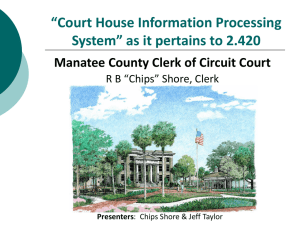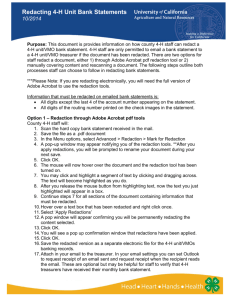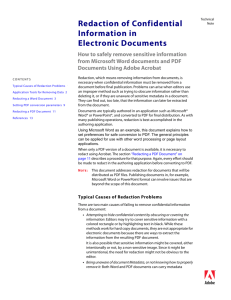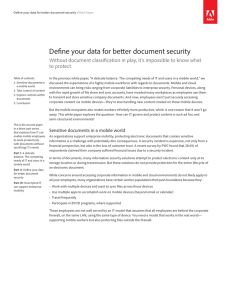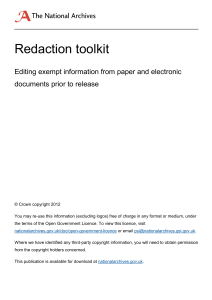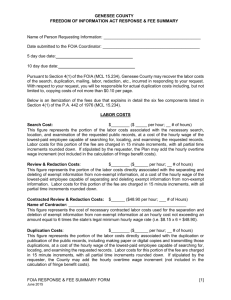Redaction considerations
advertisement
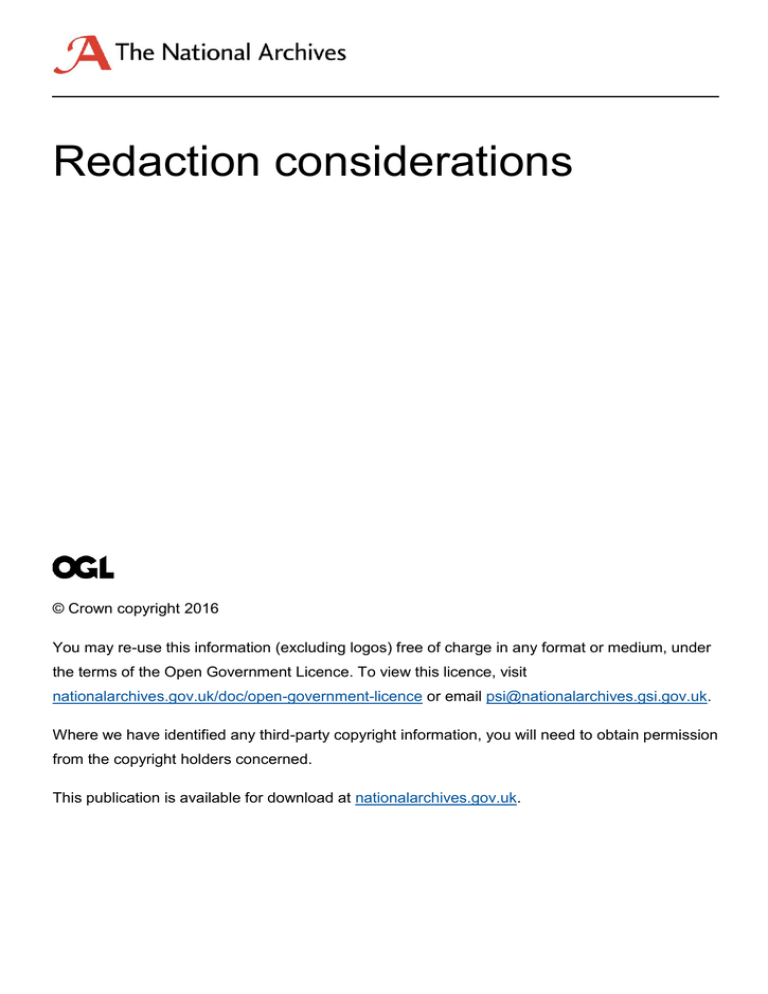
Redaction considerations © Crown copyright 2016 You may re-use this information (excluding logos) free of charge in any format or medium, under the terms of the Open Government Licence. To view this licence, visit nationalarchives.gov.uk/doc/open-government-licence or email psi@nationalarchives.gsi.gov.uk. Where we have identified any third-party copyright information, you will need to obtain permission from the copyright holders concerned. This publication is available for download at nationalarchives.gov.uk. Redaction considerations Contents Introduction .................................................................................................................................... 3 Loss of meaning ......................................................................................................................... 3 Likely level of public interest ....................................................................................................... 4 Effort required to redact .............................................................................................................. 4 Risk of error ................................................................................................................................ 4 May 2016 Page 2 of 4 Redaction considerations Introduction Redaction is the separation of disclosable from non-disclosable information by blanking out individual words, sentences or paragraphs or removing whole pages or documents prior to the release of the record. In the paper environment some organisations will know redaction as extracts, when whole pages are removed, or deletions, where only a section of text is affected. Information that is redacted but transferred to The National Archives closed forms an extract that is entered onto the catalogue, and so may be the subject of an Freedom of Information (FOI) request to review its ‘closed’ status. Part 2 of the code of practice on the management of records under section 46 of the Freedom of Information (FOIA) advises departments to consider the redaction of public records on transfer if this means parts of records can be released. Separate guidance on redacting records (the ‘redaction toolkit’) is available. Time spent on the redaction of a record should be proportionate to its historical value and the resources available for transfer preparation as a whole. When considering redaction for transfer to archives (as opposed to in response to FOI requests) there is no definitive policy on when redaction is necessary. Departments should be aware that devoting large amounts of resource to heavy redaction in one series of records may significantly delay the transfer of other open records for public use and compliance with the Public Records Act 1958 (PRA). When redaction is being considered several factors should be taken into account. The department must consider at what point the level of redaction required and the nature of the information justify individual word deletions, whole-page extraction, or closure of the whole record. Departments may need to reconsider the balance if redaction of individual records takes more than two hours. Factors include: Loss of meaning The ultimate test is whether or not redaction will result in a record that still has meaning. It is difficult to quantify this in terms of percentages as it will depend on the nature of the information. If more than a third of information needs removing from a document then the department should check that the releasable information is likely to make sense to a researcher. May 2016 Page 3 of 4 Redaction considerations Likely level of public interest When a high-profile subject appears on The National Archives’ catalogue whole record closure or retention is likely to prompt FOI requests from the public, leading to possible redaction soon after transfer if the whole record is not exempt. It would be more manageable to do such extractions/redactions before transfer, without the statutory deadlines of processing an FOI request, so a record on a major historical event might justify considerably more than 2 hours' effort on redaction before transfer if the content is of high public interest, whereas it may be difficult to justify spending considerable time redacting files if they are likely hardly ever to be consulted. Effort required to redact What is the quantity of information that requires redaction? If it is a significant proportion then the whole record can be closed. This must to some extent be considered proportionately to the size of the piece – one hour spent on a slim report may be excessive, whereas on a 400-page file it may not. Removing pages as extracts would be quicker than making individual deletions on pages. Departments should also consider how much meaning would be left in a file after the deletions have been made. Risk of error Redaction always carries the risk of something sensitive being overlooked, and therefore inadvertently released. High volumes of redaction within a single piece increase the risk of a slip in concentration, especially where it is repetitive, for example, the deletion of all references to a list of people or places. A high volume of scattered but repetitive sensitivities should be considered a high risk. It may be safer to extract whole pages. Departments should consider how experienced staff are at carrying out redaction and what the possible consequences of human error will be if mistakes are made. May 2016 Page 4 of 4
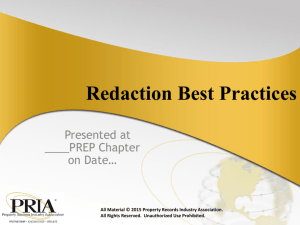
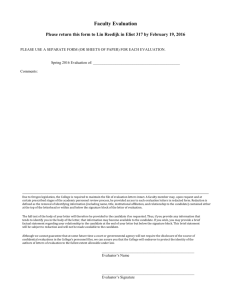
![[#CRM-5786] Redaction based on regular expressions needs to](http://s3.studylib.net/store/data/007247042_1-b5801852a627aaabfa50612ffe29d6d9-300x300.png)
